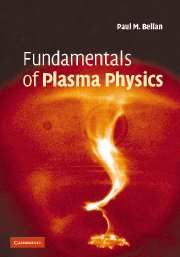Book contents
- Frontmatter
- Contents
- Preface
- 1 Basic concepts
- 2 The Vlasov, two-fluid, and MHD models of plasma dynamics
- 3 Motion of a single plasma particle
- 4 Elementary plasma waves
- 5 Streaming instabilities and the Landau problem
- 6 Cold plasma waves in a magnetized plasma
- 7 Waves in inhomogeneous plasmas and wave-energy relations
- 8 Vlasov theory of warm electrostatic waves in a magnetized plasma
- 9 MHD equilibria
- 10 Stability of static MHD equilibria
- 11 Magnetic helicity interpreted and Woltjer–Taylor relaxation
- 12 Magnetic reconnection
- 13 Fokker–Planck theory of collisions
- 14 Wave–particle nonlinearities
- 15 Wave–wave nonlinearities
- 16 Non-neutral plasmas
- 17 Dusty plasmas
- Appendices
- Bibliography and suggested reading
- References
- Index
12 - Magnetic reconnection
Published online by Cambridge University Press: 05 June 2012
- Frontmatter
- Contents
- Preface
- 1 Basic concepts
- 2 The Vlasov, two-fluid, and MHD models of plasma dynamics
- 3 Motion of a single plasma particle
- 4 Elementary plasma waves
- 5 Streaming instabilities and the Landau problem
- 6 Cold plasma waves in a magnetized plasma
- 7 Waves in inhomogeneous plasmas and wave-energy relations
- 8 Vlasov theory of warm electrostatic waves in a magnetized plasma
- 9 MHD equilibria
- 10 Stability of static MHD equilibria
- 11 Magnetic helicity interpreted and Woltjer–Taylor relaxation
- 12 Magnetic reconnection
- 13 Fokker–Planck theory of collisions
- 14 Wave–particle nonlinearities
- 15 Wave–wave nonlinearities
- 16 Non-neutral plasmas
- 17 Dusty plasmas
- Appendices
- Bibliography and suggested reading
- References
- Index
Summary
Introduction
Section 2.6.4 established the fundamental concept underlying ideal MHD, namely that magnetic flux is frozen into the plasma. This concept means that the magnetic topology of an ideal MHD plasma cannot change because a change in magnetic topology would require a change of magnetic flux within the frame of the plasma. Chapter 10 showed that ideal MHD plasmas are susceptible to two distinct types of instabilities, pressure-driven and current-driven. Pressure-driven modes draw on free energy associated with heavy fluids stacked on top of light fluids in an effective gravitational field whereas current-driven instabilities draw on free magnetic energy and involve the plasma attempting to increase its inductance in a flux-conserving manner. Both of these instabilities occur on the Alfvén time scale defined as some characteristic distance divided by vA.
It is possible for an MHD equilibrium to be stable to all ideal MHD modes and yet not be in a lowest energy state. Because ideal MHD does not allow the topology to change, a plasma that is not initially in the lowest energy state will not be able to access this lowest energy state if the lowest energy state is topologically different from the initial state. However, the lowest energy state could be accessed by non-ideal modes, i.e., modes that violate the frozen-in flux condition, and so the available free energy could drive an instability involving these non-ideal modes.
- Type
- Chapter
- Information
- Fundamentals of Plasma Physics , pp. 410 - 435Publisher: Cambridge University PressPrint publication year: 2006



